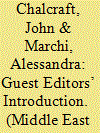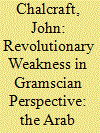|
|
|
Sort Order |
|
|
|
Items / Page
|
|
|
|
|
|
|
| Srl | Item |
| 1 |
ID:
178137


|
|
|
|
|
| Summary/Abstract |
This Special Issue is based on an academic collaboration going back to a conference held at the Università degli Studi di Bari in Italy, on 30 November and 1 December 2017, and entitled ‘Gramsci in the Arab World.’ The conference organizers were Gennaro Gervasio, Patrizia Manduchi and Alessandra Marchi in collaboration with the Centro Interuniversitario di Ricerca per gli Studi Gramsciani, the Gramsci Foundation of Italy, the GramsciLab at the University of Cagliari, and the International Gramsci Society (IGS). It marked the 80th anniversary of Antonio Gramsci’s death. The longest period of Gramsci’s incarceration (June 1928–November 1933) was in Turi, a prison not far from the conference site. Delegates were able to view a selection of Gramsci’s actual prison notebooks, which his sister-in-law, Tatiana Schucht (d. 1943), successfully saved from prison. These provided us a vivid encounter with the traces and intellectual results of struggles from an Italian and European past, an encounter that underlined connections with a Middle East and North Africa beset with political incarceration, problems of revolutionary leadership, counter-revolution, proto-fascism, state violence, colonisation, socioeconomic crisis, and right wing populism.
|
|
|
|
|
|
|
|
|
|
|
|
|
|
|
|
| 2 |
ID:
178143


|
|
|
|
|
| Summary/Abstract |
This article sets out a Gramscian perspective on revolutionary weakness in the MENA. It aims not at a top-down analysis of how activists were crushed, but at a bottom-up analysis evaluating activist activity. Drawing on a reading of Gramsci, fieldwork in Egypt, and recent research on MENA protest, it adopts a Gramscian concept of transformative activity and applies it to the MENA since 2011. It argues that the basic elements of transformative activity in Gramsci include subaltern social groups, conceptions of the world, collective will, organisation, strategy/tactics, and historical bloc. It argues that transformative activity involves the organic articulation of these distinct moments in a complex, differentiated unity. On the basis of this view, the article shows how sense can be made of revolutionary weakness in the MENA since 2011 through a critical analysis of problems in the organic articulation of revolutionary mobilisation.
|
|
|
|
|
|
|
|
|
|
|
|
|
|
|
|
|
|
|
|
|